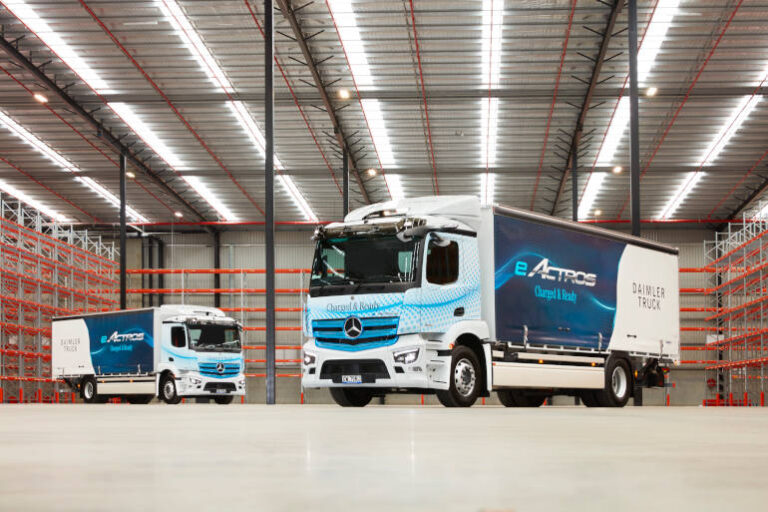A battery circular economy is paramount for the future of heavy vehicles, yet it is shrouded by uncertainty.
Fleet EV News attended the Australian Battery Recycling Summit held in Sydney last week to hear the discussion on the future of heavy duty vehicles and the importance of a battery circular economy.
The discussion was chaired by Katharine Hole, CEO, Association for the Battery Recycling Industry and featured a panel of experts; Natalie Thompson, Chief of Staff and Senior Manager of Policy for Electric Vehicle Council, Dickson Leow, General Manager of Infinitev, Sarah Forbes, Director of Commercial Solutions for Volvo Buses APAC, and Romesh Rodrigo, Head of Regulatory Affairs and Emerging Mobility Sales for Daimler Trucks. The panel was unified by the importance of building Government understanding of Heavy Electric Vehicle safety, establishing a larger and more equipped charging network for Heavy Vehicles, the danger of hasty policy, and the ever-growing necessity of recycling heavy vehicle batteries.
Battery recycling and handling procedures require complex solutions with no single answer. It was established by the panel that to create a battery circular economy which can financially sustain itself, an ecosystem of procedures must be developed to adequately deal with the size, weight and output of a myriad of batteries in a range of applications.
Natalie Thompson put forward that “Australia is in the very early stages.” of establishing an ecosystem which can cope with the “volume of batteries to actually develop solutions”. She suggested that to move forward, there must be coordination across industry and government, particularly focusing on what benefits the government can provide to potential recycling businesses whilst they wait for current heavy vehicles to reach their end of life. Currently, there is no incentive for businesses to begin recycling in Australia, and consequently, a majority of heavy vehicle batteries are being recycled offshore.
Some battery recycling is possible thanks to companies like Infinitev. As more heavy vehicles enter the public market, it has become more apparent that infrastructure is needed for heavy vehicle battery second life. Dickson Leow stressed that defective batteries must not be discarded and can often be repaired or recycled for rare materials, stating “when a battery fails, it is generally not the whole pack, and usually is only the one module”.
Infinitev work with OEMs to reuse batteries and ensure their safety and dependability when they are reinstalled in the vehicle. This is accomplished by re-programming and re-balancing the stack to ensure it can communicate as intended with the receiving vehicle. Leow elaborated on the options for recycling batteries, noting that in the event a heavy vehicle battery cannot be reused, infrastructure has started to be established to repurpose or recycle batteries efficiently and safely, stating: ”After nine months of discussion with government agencies, we got our certification for our process and framework for our battery reusing and repurposing process.”
Heavy vehicles are a crucial industry which cannot be put on hold whilst legislation is established. Romesh Rodrigo addressed the summit with a powerful statement: “Regulation and consistency is really important for an industry that can’t afford to stop”. He reaffirmed the importance of regulations being well thought out and thorough before being implemented, to ensure blanket solutions do not deter OEMs away from the Australian market.
Building upon this, Sarah Forbes affirmed that legislation must incorporate safety, stating “a bus is a human life. It is government funded and It is taxpayer funded, and decommissioning must be standardised”. Her main focus was on the lack of understanding surrounding how heavy vehicle batteries can be dealt with in the extremely unlikely event of combustion, and how currently there are no concrete processes established to deal with it. “It’s not like you just pull the fuse, you don’t just flip off a switch, you don’t just douse it in water. There are lots and lots of complexities that are involved that I don’t think they are well understood across the board”
In summary, the panel provided critical information on how heavy vehicle batteries can be reused in second life, and recycled when they are decommissioned. They pressed for complex policy to be established in order to deal with a range of heavy vehicle batteries varying in size and construction. Finally, they addressed the issues of personal safety and how combusting batteries should be dealt with. It is evident that currently, Australian heavy vehicle industries are frustrated with the lack of action taken by the government to build an ever-necessary battery circular economy.






